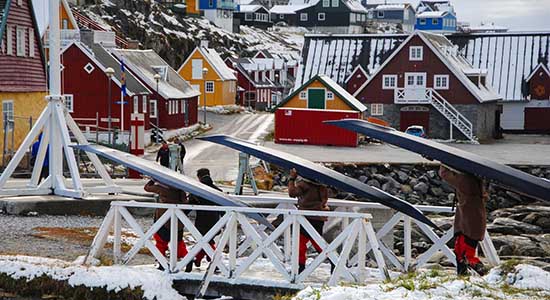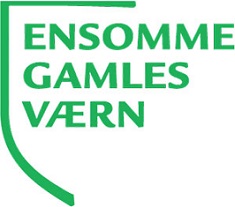Ageing in the Arctic
In Greenland, the number of elderly people has been increasing in recent years; however, knowledge about their living conditions is still limited. The aim of the AgeArc project was to address this knowledge gap by exploring the health, well-being, and quality of life of older people in Greenland through cultural-analytical and cultural-historical studies and population surveys.

The research contributes to the development and implementation of new health promotion initiatives and solutions in four Greenlandic municipalities, as well as suggestions on how to improve training for health professionals. The project involves the integration of practice and research, and the implementation of new initiatives must transpire in the municipalities. Therefore, the emphasis of the project is on the inclusion of cultural knowledge about Greenlandic conditions and experiences with current practice in the field. New knowledge and understanding of conditions and wishes in the field of elderly care must be created.
Aging in the Arctic is developed and implemented in close collaboration among the four Greenlandic municipalities as well as researchers, health professionals, and educational leaders from the University of Copenhagen, Ilisimatusarfik (University of Greenland), the Danish National Centre for Social Research (SFI), the University of Southern Denmark, and UCC University College.
Research on Aging in the Arctic (AgeArc) is based on different types of questions and research methods. The quantitative part of the research is based on population surveys, whereas the qualitative part comprises ethnographic and historical studies.
The quantitative part of the research consists of questionnaire surveys conducted by the National Institute of Public Health (SIF), which is responsible for the Population Survey in Greenland, and by SFI, which oversees the “Ældredatabasen” in Denmark. The questions in the two databases will be coordinated to allow for the comparison of the responses from older people in Greenland and Denmark. This part of the research will provide knowledge about the health and living conditions of older people and how to improve population surveys of this kind to better reflect regional characteristics.
Meanwhile, the qualitative part of the research entails an in-depth examination of the individual’s everyday life as well as the policies and practices in elderly care and other municipal services for older people in Greenland. This part is undertaken by the University of Copenhagen and the University of Greenland (Ilisimatusarfik), and it consists of ethnographic fieldwork among older people and health professionals as well as document studies of policies, strategies, and citizen information, among others, in the field of elderly and health care. In addition, this part includes historical studies on the roles and conditions of older people. The aim is to gain knowledge about the roles and opportunities of older people in society, past and present, and to understand the relationship between older citizens, the welfare state, and its representatives.
The results of the project have resulted in the publication of several articles and reports:
Papers
Nørtoft, K. & Jensen, T. (2020). Utoqqaat inuunerat – ældreliv i Grønland, Bibliotek for Læger, 212. årgang, s.174-191.
Nørtoft, Kamilla, Bjerregaard, Peter, Hounsgaard, Lise, Larsen, Christina VL, Olesen, Ingelise, Jensen, Tenna. 2019. Ældre menneskers liv og helbred i Grønland. En rapport fra forsknings- og udviklingsprojektet Arktisk Aldring. Syddansk Universitet. (Internal review, SIF)
Nørtoft, K, Jensen, T. 2019. Ildsjæle I ældreplejen I Grønland, Omsorg, 36, 3, 44-48
Schlütter, M. 2019. At rejse for at leve, Omsorg, 36, 3, 18-23
Nørtoft, K., Carroll, S., Siren, A., Bjerregaard, P., Larsen, C.V.L., Brædder, M., Hounsgaard, L. & Jensen, T. (2018): Enhancing Well-Being Among Older People in Greenland through Partnerships of Research, Practice and Civil Society, In: Heininen, L. and H. Exner-Pirot (eds.) (2018). Arctic Yearbook 2018. Akureyri, Iceland: Northern Research Forum.
Nørtoft, K., Hounsgaard, L. & Jensen, T. (2018): Udearealer ved ældreboliger i Sisimiut – et samskabelsesprojekt i Arktisk Aldring. Årsskrift, Ilisimatusarfik.
Nørtoft, K. & Jensen, T. (2018): Mad i alderdommen – livskvalitet, netværk og aktiv aldring. Tikiusaaq.
Schlütter, M. M. Ældres livshistorier – et bidrag til historien om Grønland. Tidsskiftet Grønland. November 2018.
Nørtoft, K. & Jensen, T. (2017), Aldringsidentitet i spændingsfeltet mellem fangersamfund og velfærdsstat. i Psyke og Logos: Psykologiske perspektiver i Grønland. 1 udg, bind 38, Psyke & Logos, s. 32-51.
Reports
Nørtoft, K, Jensen, T. (2020). Undersøgelse blandt pårørende til mennesker med demens i Kommuneqarfik Semersooq.
Nørtoft, K, Jensen, T. (2020). Kvalitativ viden om demensområdet i relation til Demensplan 2013 - fokus på indsatsområderne 2,3,4 og 7.
Nørtoft, K, Jensen, T. (2017). 1. kommuneworkshop i projekt Arktisk Aldring. Arktisk Aldring (AgeArc) Rapport nr. 1.
Jensen, T., Nørtoft, K. (2017). Projektproces og output. Arktisk Aldring (AgeArc) Rapport nr. 2.
Jensen, T., Schlütter, M. M., Olsen, M. A. F., Jensen, A. L., Nørtoft, K., Nielsen, L. O., Hounsgaard, L. (2018). Et godt liv for ældre i det sydlige Grønland - et eksplorativt studie af muligheder og udfordringer. Arktisk Aldring rapport nr. 3.
Nørtoft, K., Jensen, T. (2018). Qaanaaq. Arktisk Aldring (AgeArc) Rapport nr. 4.
Nørtoft, K., Jensen, T. (2020). Kvalitativ viden om demensområdet i relation til Demensplan 2013 – fokus på indsatsområderne 2,3,4 og 7.
Nørtoft, K. Jensen, T. (2020). Undersøgelse blandt pårørende til mennesker med demens i Kommuneqarfik Sermersooq.
The project is a collaboration of different research and educational institutions and four Greenlandic municipalities: The Danish National Centre for Social Research (SFI), Department of Social Policy and Welfare Greenland Centre for Health Research (GCHR), Department of Nursing and Health Sciences, Ilisimatusarfik (University of Greenland)
- Department of Anthropology, School of Culture and Society, Aarhus University
- Kommuneqarfik Sermersooq
- Municipality of Kujalleq
- University College, University College UCC,
- Health education programmes
- Avannaata Kommunia
- Qeqqata Kommunia
- National Institute of Public Health (SIF), University of Southern Denmark
Affiliated researchers
Jensen, Tenna
Nørtoft, Kamilla


